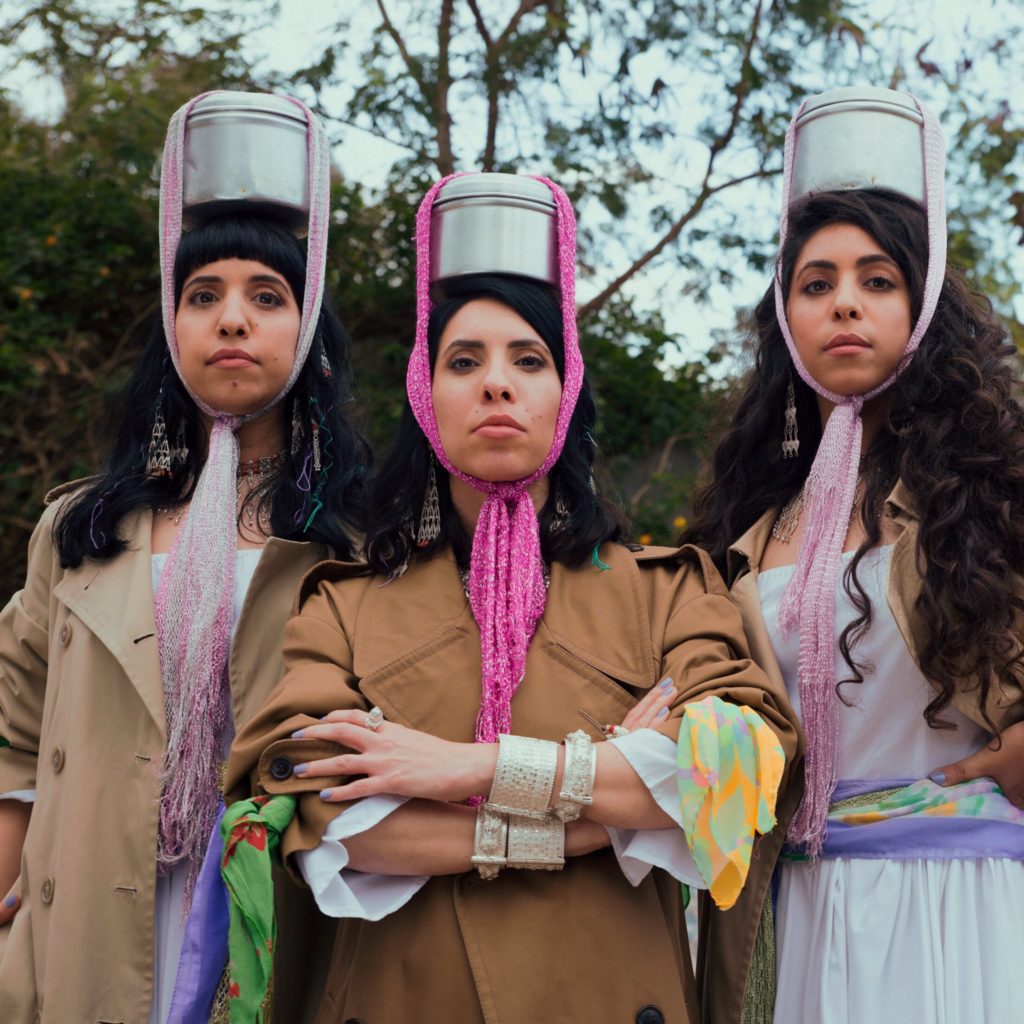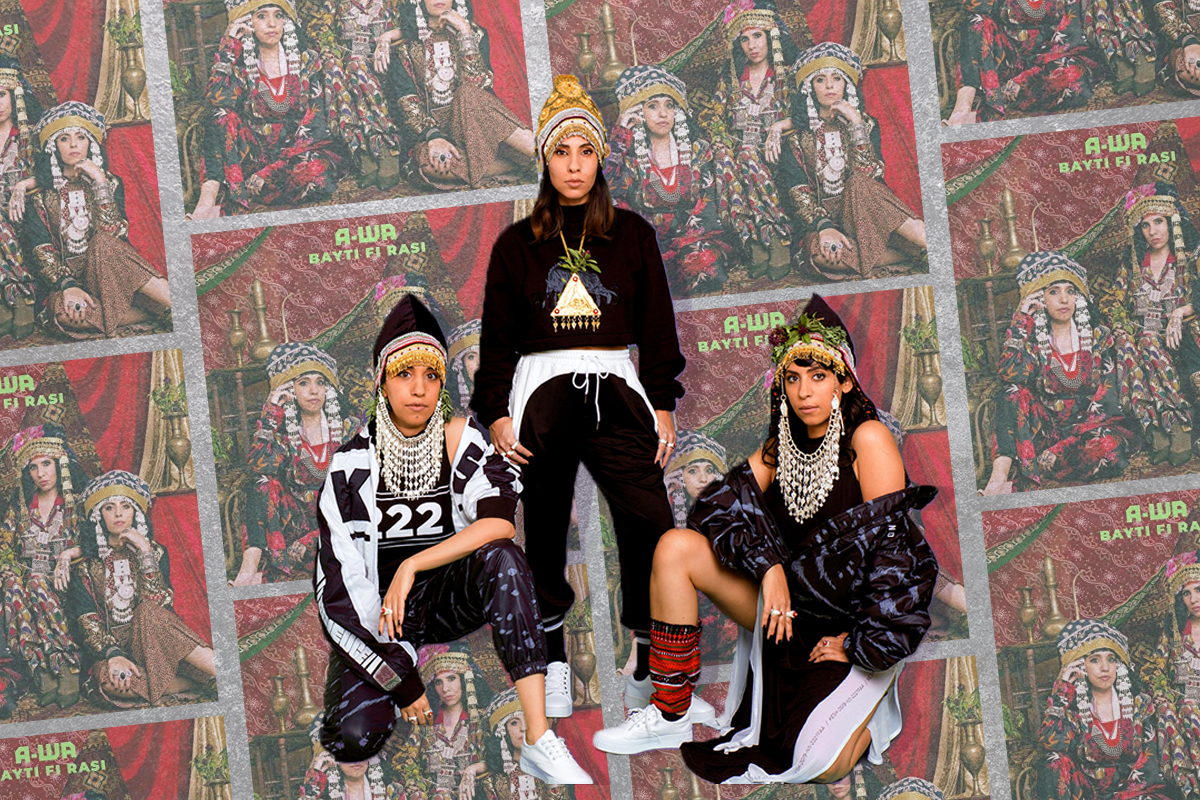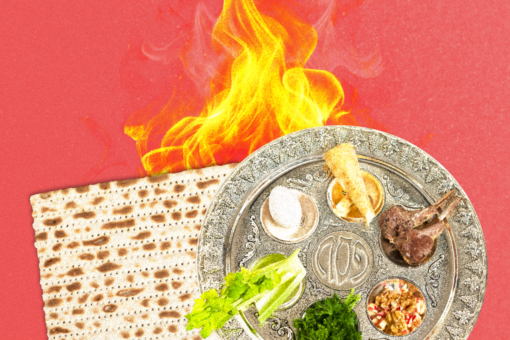Let us introduce you to a band of sisters with the last name Haim. No, not the ones you’re thinking of. Tair, Liron, and Tagel Haim are sisters from southern Israel, and together they form a band called A-WA (Arabic for “Yes,” pronounced AY-wah).
“It felt like music chose us,” Tair Haim explains. “We really have so much love to give, and so much good music, and we are all about bringing people together.”
Their musical style is unique — it’s a combination of traditional Yemenite songs, electronic music, and hip-hop. In 2016, their song “Habib Galbi” (“Love Of My Heart”) went viral, becoming the first song in Arabic to reach the top of the Israeli charts. Their debut album, also called Habib Galbi, uses traditional Yemenite folk chants and re-imagines them with electronic beats, pop music, and more. Their music is a powerful mix of modern and traditional, emphasizing their Jewish Arabic roots. And they’re the coolest. Seriously.
A-WA is currently touring for their new album, Bayti Fi Rasi. Before a show in Hanover, Germany, I got the chance to chat with Tair, the eldest sister.
“Since a very young age, we all discovered the love of music. I am the oldest sister, and I was always dancing and singing around the house. We grew up in a very small desert village in southern Israel called Shaharut. There weren’t many kids around so we were always best friends,” Tair told me. “We were known at school as the musical family from Shaharut.”
Their new album translates to My Home Is In My Head, and it tells the story of their great-grandmother Rachel’s journey from Yemen to Israel.
“She used to say, whenever she was asked in Yemen, why are you always traveling from one place to another? Why don’t you stay in one place, and she said, ‘I can’t stay in one place. My home is in my head.’ She was a very legendary character in our family; we heard a lot of stories about her from our grandma, and from our dad,” Tair says.
Their great-grandmother came to Israel from Yemen as part of Operation Magic Carpet, in which 49,000 Yemenite Jews were airlifted to Israel between 1949 and 1950. She wouldn’t agree to stay in an arranged marriage, Tair explains, and so she traveled as a single mother. Now the Haim sisters want to tell her story.
It’s a “courageous story – traveling from Yemen to Israel, coming to Israel as a refugee, and starting from scratch. And being such a strong woman. We always laugh and say she was a feminist without even knowing what one was,” Tair explains. “We had so many things we already wanted to say, and we felt like we could use her life story and her voice — things she wanted to say, but couldn’t – and kind of blended with our voices. Each song on the album represents a piece of her life.”
Unlike their last album, the sisters wrote all original lyrics for Bayti Fi Rasi. One track, “Hana Mash Hu Al Yaman” — “Here Is Not Yemen” — speaks directly to Rachel’s arrival in Israel.
“When she arrives to Israel, she’s sent to a tent camp where they couldn’t work. They had to share tents with other families, the conditions were really bad. And she’s feeling mixed emotions because she was always, as a Jewish woman, dreaming of coming to Israel. It was very tough. She didn’t come from Ashkenazi roots, she came from Yemen, an Arab country, so they treated her as a primitive [person]. They wanted the immigrants to change their names, and to lose their language and speak Hebrew.”
The sisters art directed the music video for the song by themselves, down to every last detail. “The iconic look with the pots on the head in ‘Hana Mash’… we looked at old photos of Yemenite immigrants,” Tair says. “They used to go with the pots to carry water or food — so we turned it into a modern iconic look [and] a fashionable thing. Always with a sense of humor.”

“Hana Mash Hu Al Yaman,” Tair explains, is a call-and-response song, inspired in part by the song “America” from West Side Story. In “America,” Anita sings “everything free in America,” and Bernardo responds, “for a small fee in America.” That echo is replicated in A-WA’s song. Tair sings a statement — here I will raise a family, I will learn the language — and her sisters represent the other people in the camps who “answer her cynically, twisting the knife, saying, you have a tent for now.” This references the transit camps many Yemenite Jews lived in upon their arrival to Israel.
Another call and response speaks to the long controversy over Jewish Yemeni babies: “Wahana abni ahaly (and here I will raise a family) / an la yshilu ‘alaysh albnaya (don’t let them take your daughter).” As JTA reported earlier this year, “Since the 1950s, more than 1,000 Israeli families have alleged that their children were systematically kidnapped from Israeli hospitals and given to Ashkenazi families for adoption in the country and abroad. Authorities generally dismissed the claims of the families, mostly immigrants from Yemen.”
By telling their great-grandmother’s story, the sisters of A-WA are also telling the story of Yemenite Jews in Israel, and of greater universal themes of women’s rights. “I hope that [listeners] will identify or find themselves in some of the situations. We really talk about human issues — human rights, women’s rights — so I think it’s something anyone can resonate with,” Tair says.
On the titular track, “Bayti Fi Rasi,” the sisters sing (translated), “I am a woman, I am a man, I am a journey.” Tair explains that this was something Rachel used to say: “She was always working so hard, so [she said], I am a woman and I am a man. I am capable of any work.” This resonated with the sisters, who felt it was “really relevant to our days, with all the issues of refugees, with women’s rights and the #MeToo movement, and the awareness of the status of women in society.”
Not all of their songs take on an overt political message. On the third track, “Mudbira” (Unlucky One), the sisters sing of being down on one’s luck (the chorus, translated, is “home — none / keys – none / neither luck, nor a shoe”).
While A-WA continues to gain more attention worldwide, they’re still a hometown favorite in Israel. They recently performed at the torch-lighting ceremony at the start of Yom Haatzmaut, Israel’s Independence Day. “It was a huge opportunity, a great spot for A-WA,” Tair recalls. “It’s important for us to be loved and appreciated in Israel, and do these kinds of events [to] bring our Yemenite vibe, and A-WA spirt, to places like this, where everyone is watching.” (For the non-Israelis reading: This ceremony is a huge deal. It’s like Israel’s Super Bowl half time performance, but without the sports.)
Even if you don’t understand Arabic, the music is infectious and you won’t be able to stop listening.
“We hope people who hear our music will feel at home. The whole album revolves around the question of home, identity, and questions of is life a matter of faith or luck…” Tair trails off. “We really want people to feel at home.”
Oh, and regarding those other famous Haim sisters?
“We love them and their style! And it’s so cool that we have the same last name,” Tair says. “We actually met — they’re so nice! We played in L.A. last summer and two of them came to our show. We met Este and Alana, and they were so sweet. Of course, we make a different kind of music, and I don’t think we’re related or anything, but we really like them! I mean, what are the odds? It’s working for them, it’s working for us, and we hope to see them again.”
Image of Haim sisters in header by Tamir Moosh



